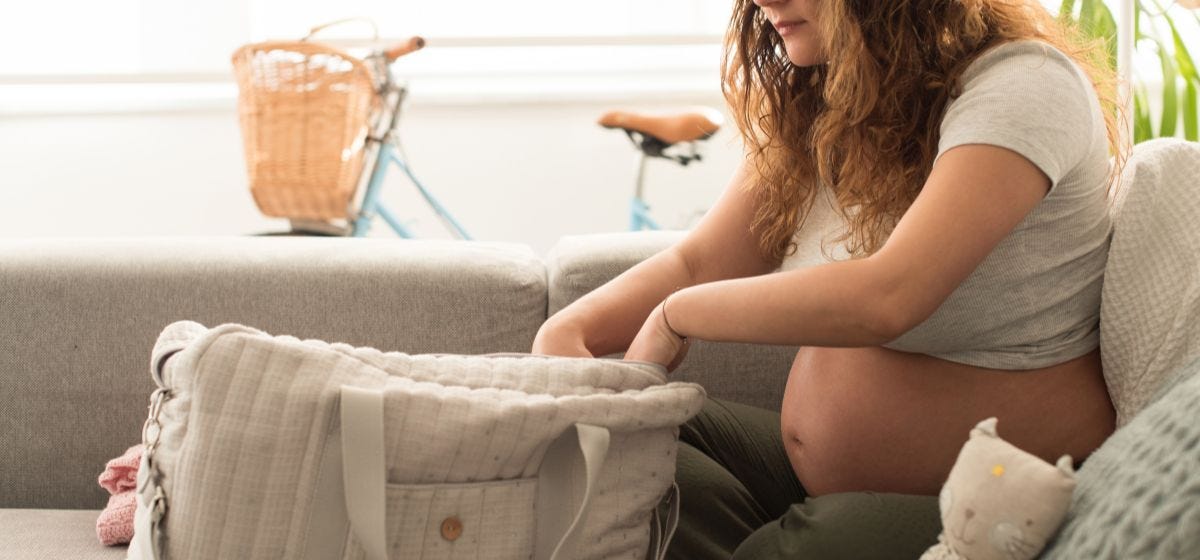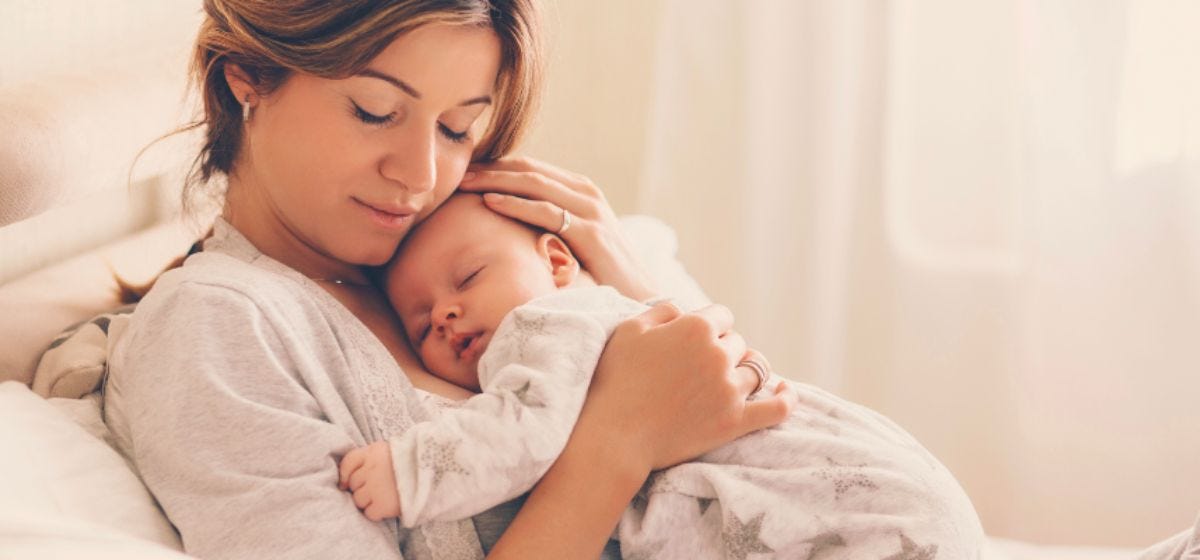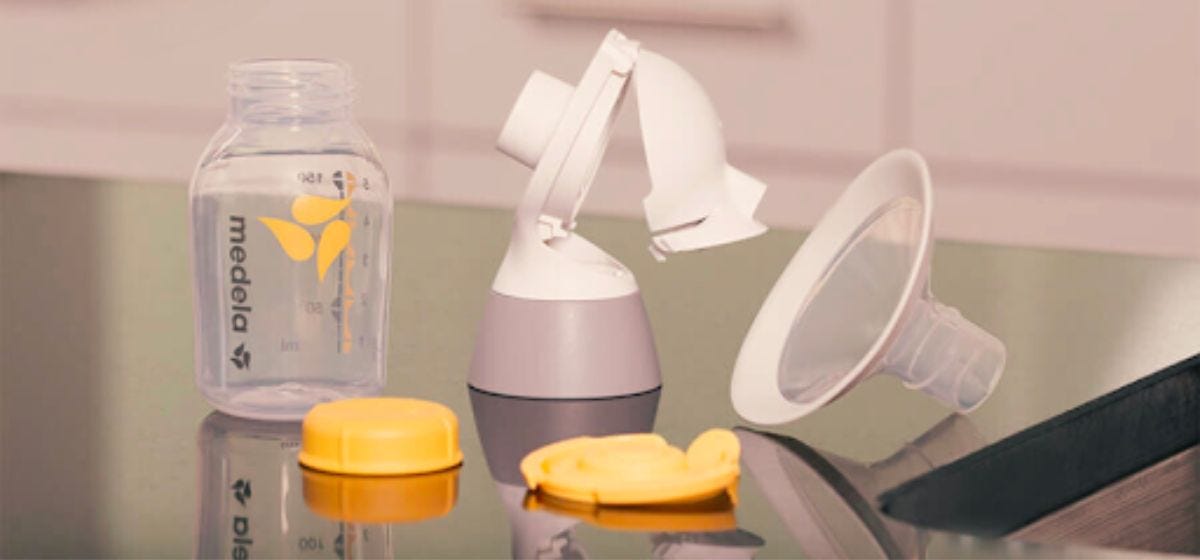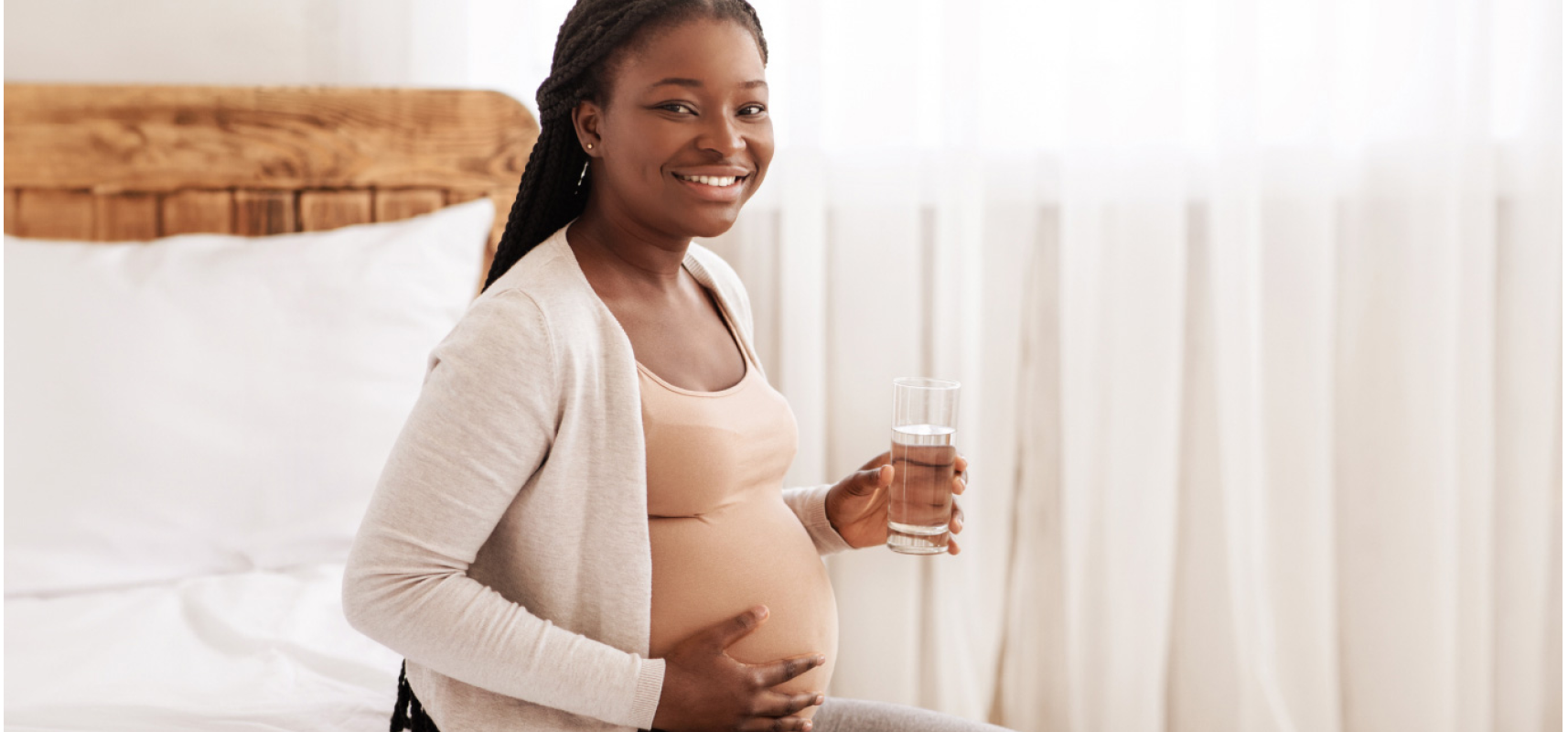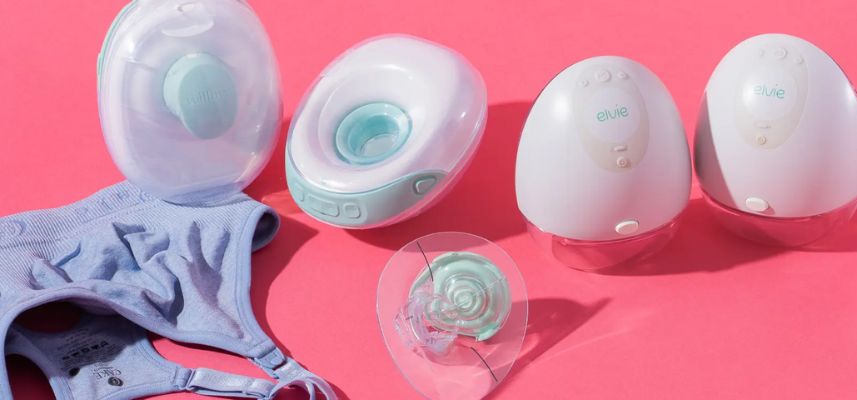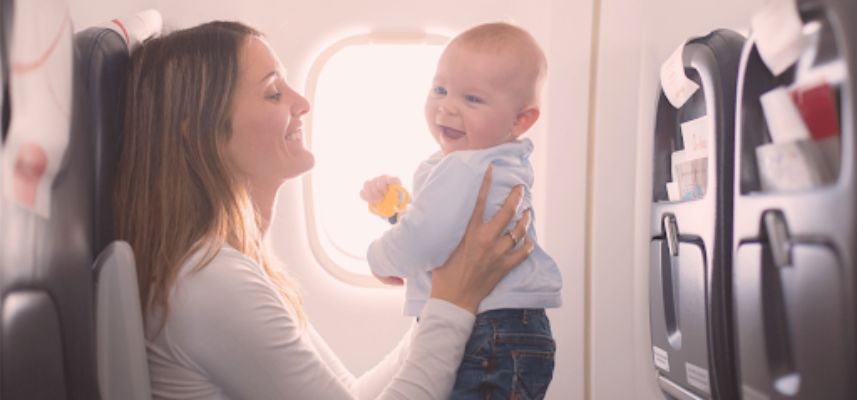The third trimester can be a busy time, full of preparations to welcome your new baby home. In between decorating the nursery and washing baby clothes, you’ll want to take some time to pack your hospital bag. Having your “go-bag” packed and sitting by the front door or in the trunk of your car can bring you peace of mind and prevent you from having to pack a bag between contractions. You’ll want to have your bag, and your partner’s bag, ready to go by 37 to 38 weeks. If you have a high risk pregnancy, you’ll want to get them ready even sooner, perhaps by 35 or 36 weeks. .
What needs to go in a hospital bag? Your hospital stay will be about 1-2 days after a vaginal birth and about 3 days after a cesarean birth. Another thing you’ll want to know is that most hospital rooms are on the small side, so there may not be much storage space. With those two things in mind, you can use our checklist as you pack your bags for the big day.
Hospital Bag Checklist for Mom
Things to have handy for labor: Pack these at the top of your bag.
- Music. Make a playlist of your favorite songs, bring headphones or earbuds, or a portable speaker.
- Massage oil or lotion. You may find a massage comforting during labor.
- A book, laptop or tablet, deck of cards. Early labor can be boring so have some items to pass the time.
- Comfort items. Do you have a favorite pillow or blanket? Bring it along. Or perhaps you would like a diffuser and essential oils. Check with your hospital or birth center to see what’s allowed.
- Lip Balm - your lips may get dry and chapped during labor.
Essential items
- Bring your driver’s license or other picture ID and your insurance card. Many hospitals will have you pre-register ahead of your due date. While they will ask for those things at that time, you may need to show them again when you arrive to have the baby.
- Four copies of your birth plan, one for your labor nurse, another for your postpartum chart where the nurses can refer to it, another to keep in your postpartum room for quick reference. Keep it on your bedside table or over-the-bed table so partners, staff and your doctor can refer to it. While you will share your birth plan with your doctor ahead of time, you’ll want to have a fourth copy to give to the doctor who is attending the birth if your primary doctor is not on call. You can meet with an Aeroflow childbirth specialist to develop a comprehensive birth plan: https://aeroflowbreastpumps.com/lactation-link-by-aeroflow-breastpump
- Your pediatrician’s information - You will be asked for this information before you go home. Also, call your pediatrician’s office for your baby’s first appointment from the hospital as he/she will want to see the baby within 2-7 days after birth.
- Bring your cell phone with a long charger, 5-10 feet is plenty. The outlets near your hospital bed may all be in use for medical equipment so you may have to use an outlet farther away.
- A cord blood kit. If you’re planning to bank or donate your baby’s cord blood, make sure to read the paperwork ahead of time and pack everything you will need.
Personal items
- Toiletries: toothbrush, toothpaste, deodorant, hairbrush or comb, makeup (if you plan to use it), hair bands or ties, and shampoo/conditioner. Consider packing them in a hanging toiletry bag as there is usually very little counter space in the bathroom.
- Glasses and/or contacts, lens solution and a contact lens case if necessary. If you are having a c-section, you’ll be asked to remove your contacts and you’ll want your glasses for that first look at your baby.
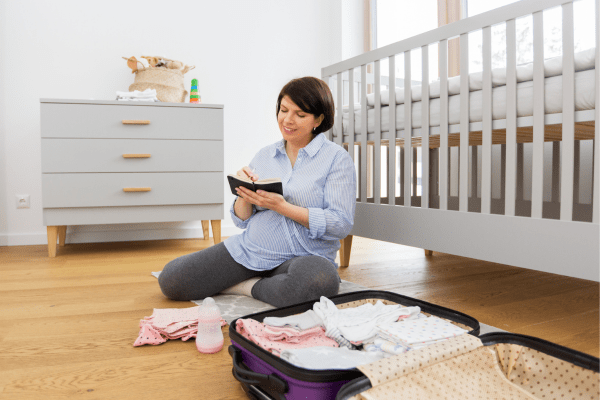

- Sanitary pads. The hospital will provide these, but if you have a brand you prefer, bring a pack. You will experience heavy bleeding in the first days after birth and you will continue to have discharge for a few weeks so be sure to have a stock of heavy flow pads at home. Check out these postpartum pads on Aeroflow’s website: Mama Strut Postpartum Pads
- Nursing pads - The hospital can provide nursing pads but you may want to bring your own. Nursing pads come in disposable and reusable types. Some women leak a lot in the early weeks so disposable pads would work well for that time. You may find you prefer reusable pads after those first days and weeks. You can find both types of pads on the Aeroflow website: Nursing Pads
Clothing
- Two pairs of pajamas and/or comfortable daytime outfits. You will find you tend to sweat a lot as your hormones change after both so having an extra change of clothing will keep you comfortable. Bring a robe or sweater as you may be hot one minute and cold the next. Some tips for clothing: make it lightweight with short sleeves for blood pressure checks and lab work; choose tops that open in front to make breastfeeding and skin to skin easier. You may want to use the hospital gowns throughout your stay or for the first day when your flow is heaviest.
- Slippers or socks with grip soles. The hospital can provide the socks, but if you have a brand you prefer, bring them along.
- Nursing bras. Practice unclipping beforehand so you're not fumbling with a baby on your lap who is telling you how hungry he is!
- Postpartum underwear. Picture how you looked when you were 6 months pregnant. That, unfortunately, is how you will look in the first week or so after having your baby. The hospital has stretchy, mesh panties for your use but some women prefer their own. If that’s the case, you may want them to be panties you don’t mind throwing away.
- Snacks. Lots of snacks. You will be making milk and that takes fuel. Many new moms find they are ravenous after delivery, Three meals a day won’t be enough. So bring things like fresh or dried fruit, trail mix or protein bars.
- Your baby book, or a notepad and journal. You can use a notepad to write down questions for your doctor or nurse, journal thoughts about the birth or fill out your baby book (including footprints).
- Gifts for older siblings. Some parents with children at home bring gifts for the new baby to give to older brothers and sisters when they visit.
For Baby
- Car seat. you will need to have the base installed in the car before going home so why not think about installing it when you pack your bag. Leave the carseat in the car during your hospital stay and bring it to your room the day you go home. Hospital staff cannot install a car seat and buckle your baby in unless they have taken a car seat safety course so you will want to read the instructions and practice buckling in a doll or stuffed animal to become proficient before leaving the hospital.
- Baby outfit for going home. The hospital will provide long sleeve shirts, caps and swaddle blankets while you are there, but you need to pick something for the day you take your baby home.
For Your Partner or Support Person
- A pillow. While postpartum rooms will have a place for you to sleep and will provide sheets, blankets and a pillow, most hospital pillows are most often flat and you’ll sleep better on your own.
- Two changes of clothes, something to sleep in and comfortable shoes.
- Toiletries - Toothbrush, toothpaste vision and grooming supplies.
- A water bottle or drinks.
- Cell phone and 3 to 5-foot charger.
- Camera or video camera- if you want to use something more than a phone camera. Most hospitals will not allow you to film the birth itself, but filming during labor and after delivery is fine.
- A credit card and change. You’ll need it for parking and vending machines.
What Not to Bring to the Hospital
- Diapers and wipes - the hospital will provide all the diapers and wipes you’ll need - and may send a few home with you.
- Bottles and nipples - if you are bottle feeding the hospital will provide both. They will be pre-filled two ounce bottles.
- Formula - If you are formula feeding, the hospital will provide formula. However if you prefer a particular brand or type, bring it with you along with a few sterilized bottles and nipples.
- Medications - Any medication you normally take, whether prescription or non-prescription, will be provided by the hospital. Medications that you bring to the hospital must be approved and relabeled by the pharmacy, and that can take some time.
- Valuables and cash - leave your good jewelry at home along with most of your money. If you need money at all, it might be a little change for vending machines.
- Candles - Birth centers and hospitals won’t allow them because the compressed oxygen present in the wall outlet and the candle flame don’t mix well. However, you may be able to bring a diffuser and essential oils.
- Your breast pump. If a situation arises in which you need to pump, the hospital will provide a pump for you to use while you are there. Aeroflow carries a wide variety of personal breast pumps. To pick out an insurance-covered pump, go to our breast pump page: Breast Pumps Through Insurance You will want to learn how to use your pump before you need it. Aeroflow has three classes to help you pick the best breast pump for you, learn the basics of how to pump, and learn how to get the right size flange for you. To access classes, click here: Lactation by Aeroflow Breastpumps; In addition, check out our videos for more information. Video Resources
- Storage bags or bottles to store the milk you may pump. The hospital will provide containers and keep your milk in a freezer used only to store milk. Don't forget to ask for your milk when you go home!
Feeling prepared and confident about what you are bringing will help decrease some of the unknown surrounding your birth and postpartum. Packing is a part of nesting and you may feel a strong urge to get it accomplished.
What If I Have Questions?
If you are interested in learning more about preparing for birth, you can schedule a one-on-one appointment with an Aeroflow lactation consultant here.
Your birth plan is one of the most important items you should remember to pack. If you would like assistance crafting your birth and breastfeeding plan, our dual certified lactation consultant/doulas are happy to meet with you to discuss. Write to birthplan@aeroflowbreastpumps.com to schedule.

